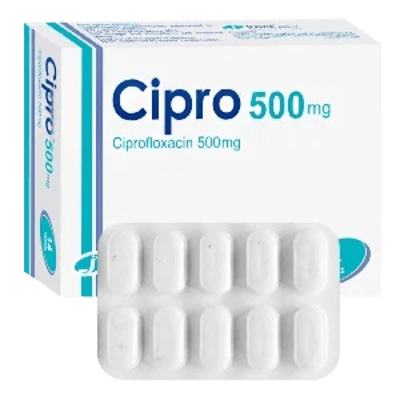My doctor prescribed Cipro to me after I developed a serious respiratory infection. I took it exactly as directed and within a couple of days I noticed a significant improvement. I havent had any side effects yet and I feel much better.

Cipro
- Quality products
- Support 24/7
- Fast delivery
What is it?
Cipro is an antibiotic from the fluoroquinolone group, effective against various bacterial infections. It is designed to kill or inhibit the growth of bacteria, which is why it successfully treats various diseases: urinary tract infections, respiratory, skin, gastrointestinal and bone infections. However, it is important to understand that Cipro is not effective against viral infections, such as colds or flu. Despite its wide range of applications, the use of the drug should be agreed with a doctor to avoid unwanted consequences and ensure proper treatment.
Composition
The drug Cipro contains the main active ingredient ciprofloxacin, which belongs to the class of fluoroquinolones. Fluoroquinolones are a group of antibiotics known for their ability to fight a wide range of bacterial infections. Cipro contains several excipients that help increase the effectiveness and absorption of the drug. They also reduce the possibility of side effects.
- Ciprofloxacin is the main active ingredient that provides antibacterial action.
- Lactose monohydrate is an auxiliary substance used to ensure the homogeneity of tablets.
- Crospovidone is an auxiliary substance created to improve the solubility of the drug.
- Magnesium stearate - acts as a lubricant in the tablet manufacturing process.
- Talc - is added to prevent tablets from sticking together and to increase their stability.
Each of these components plays its own role in the creation of the drug, but it is ciprofloxacin that determines the unique properties and effectiveness of Cipro.
How to use?
For maximum effectiveness and safety, Cipro must be taken exactly as directed by your doctor. It is important to follow all instructions to avoid the risk of side effects and recurrence of infection.
- Take Cipro orally with a full glass of water. This helps reduce the risk of gastrointestinal irritation and improves absorption of the medicine.
- Take the tablets regularly, without skipping doses, even if the condition has improved, to ensure complete destruction of bacteria.
- If you miss a dose, take it as soon as possible. However, if it is almost time for your next dose, skip the missed dose and continue taking it as scheduled.
- Avoid combining Cipro with dairy products, as this may reduce the effectiveness of the drug. However, the drug can be taken with food containing a small amount of calcium.
- If you are taking other medications, be sure to inform your doctor about the possibility of interaction with Cipro, as this effect may affect the effectiveness of the treatment.
These recommendations will help you avoid common mistakes when taking antibiotics and speed up the recovery process.
How does it work?
When ingested, Cipro, thanks to its main component ciprofloxacin, specifically targets bacterial cells, inhibiting their growth and reproduction. This occurs by blocking an important enzyme necessary for the synthesis of bacterial DNA. Thus, the cells lose the ability to continue their life cycle, which leads to their gradual destruction.
The antibiotic has high bioavailability, so it is quickly absorbed into the blood and begins to actively act on the foci of infection. Cipro effectively penetrates many tissues of the body, which makes it a suitable remedy for the treatment of various types of bacterial infections. However, it is important to remember that Cipro treatment should be carried out strictly on the recommendation of a doctor to avoid the development of bacterial resistance and side effects.
The duration of therapy and dosage depend on the type of infection and its severity, which makes a doctors consultation mandatory. Correct use of the drug contributes to the effective destruction of the disease and accelerates the patients recovery.
Indications
Cipro is used to treat a variety of bacterial infections. It is the drug of choice for a variety of pathological conditions caused by bacterial pathogens.
- Urinary tract infections, common in patients of all ages.
- Respiratory infections, such as bronchitis or pneumonia, caused by bacterial pathogens.
- Skin and soft tissue infections, often occurring after injuries or invasive procedures.
- Gastrointestinal infections, including complex forms of gastroenteritis.
- Bone and joint infections that are difficult to treat with other means.
With its broad spectrum of action, Cipro is a versatile and reliable remedy, but only a doctor can determine its appropriateness in each specific case.
Contraindications
Despite the effectiveness of Cipro, like any drug, it has a number of contraindications that must be taken into account before starting treatment. Patients should consult a doctor to determine whether this drug is suitable for them.
- Allergy to ciprofloxacin or other fluoroquinolone antibiotics.
- A history of joint problems in children, which may be aggravated by the use of the drug.
- Cardiovascular pathologies, especially severe forms of arrhythmia.
- Kidney or liver disease, requiring special caution when choosing an antibiotic.
- Epileptic seizures or other serious neurological disorders.
Pregnant and lactating women should also discuss the possibility of taking Cipro with a doctor, taking into account all possible risks to the child and mother.
Side effects
Like many antibiotics, Cipro can cause side effects that need to be taken into account when prescribing treatment. The variety of reactions to the drug makes it necessary to regularly monitor the patients condition.
- Digestive disorders such as nausea, diarrhea, or stomach pain.
- Allergic reactions, including rash or itching, which is a serious reason to immediately stop taking the drug and consult a doctor.
- Dizziness or headache, which may limit the ability to drive vehicles or operate machinery.
- Drowsiness or fatigue that occur as a reaction to the drugs effect on the central nervous system.
- Increased sensitivity of the skin to sunlight, requiring avoidance of the sun and the use of protective cream.
Patients should carefully monitor their feelings during treatment and, if side effects occur, consult a doctor about the advisability of further use of the drug.
Frequently asked questions
Cipro Reviews and Experiences
I used Cipro to treat a urinary tract infection that had been bothering me for some time. The effect was quite fast, but I experienced some nausea during the first few days of taking it. However, this soon passed and now, a week later, I am fine.
My doctor prescribed Cipro after diagnosing me with a skin infection. At first I was worried about possible side effects, but fortunately there were no problems. I noticed an improvement in my skin condition on the third day of taking it, which was very pleasing.









